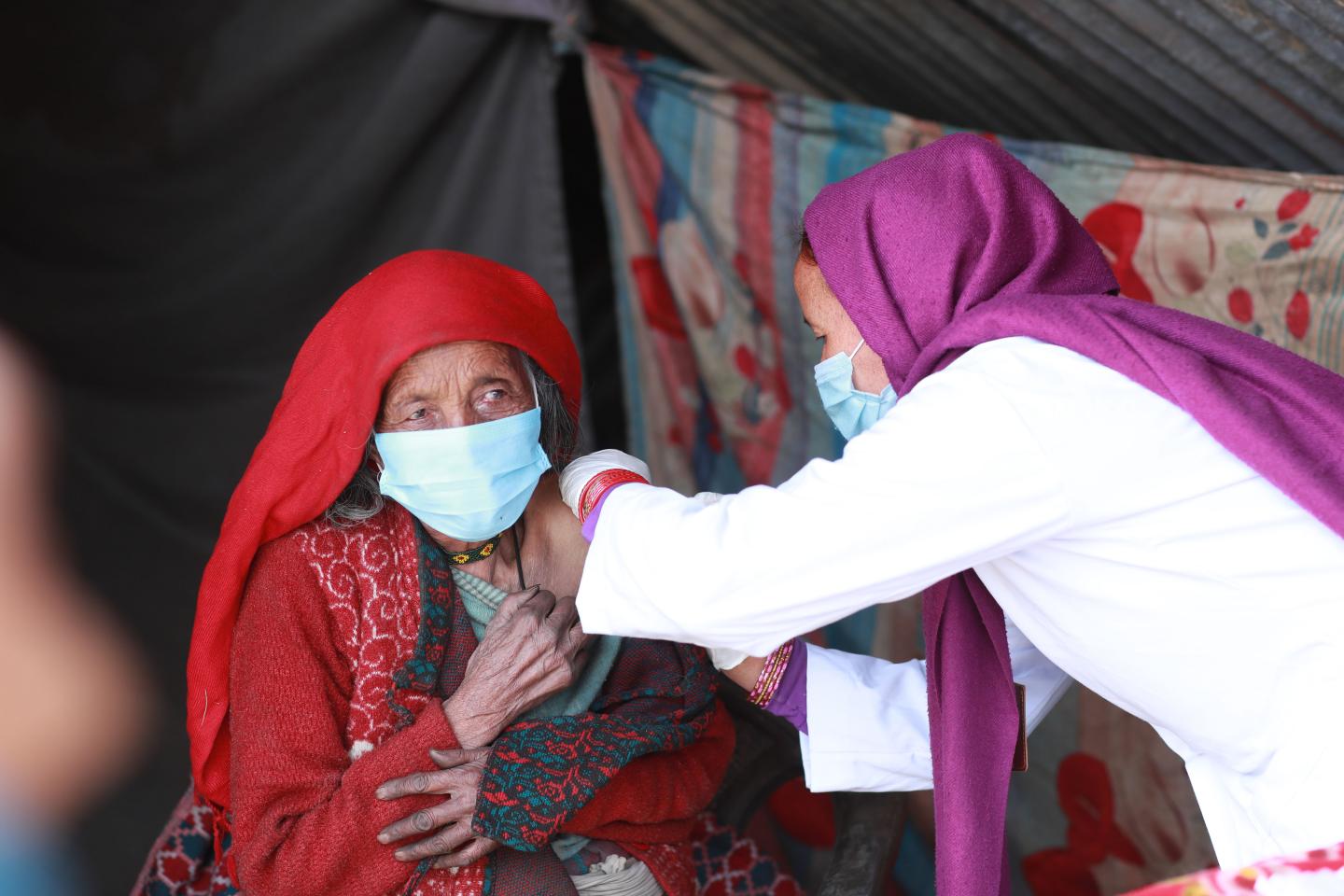Our series of Academic Blog continues with this piece written by Atiyah J. Hack – Russell, who has conducted extensive research into the effects of the COVID-19 crisis on mental health of women in rural communities in regions like the country of Nepal. As a part of the Office of Global Initiatives’ 2021 Local to Global Internship Series, Atiyah worked with Live to Love International, specifically with their base in Nepal.
The Tirade on Women’s Mental Health, by Atiyah J. Hack – Russell
Mental Health Issues are a growing concern and a growing consequence of the COVID-19 Pandemic – a result of the spread of the highly contagious and newly discovered coronavirus called SARS-CoV-2 (COVID-19) which emerged from Wuhan, China in December 2019 – and the implementation of governments’ global lockdown measures – a consequence of the transmission of the new coronavirus which as of now has resulted in a total of 206 million cases and a total of 4.34 million coronavirus-related deaths – disproportionately impacting millions of individuals and communities across the globe, especially marginalized and vulnerable populations like women, and more specifically women in rural communities in regions like the country of Nepal. According to the article written by Jeffery Kluger, “The Coronavirus Pandemic’s Outsized Effect on Women’s Mental Health Around the World”, “while almost nobody is spared from the anxiety, worry, and overall emotional fatigue of the coronavirus pandemic, women are almost three times as likely as men to report suffering from significant mental health consequences (27% compared to 10%), including anxiety, loss of appetite, inability to sleep and trouble completing everyday tasks” (Kluger. 2020).
To support this statement, in the article, studies such as a new study conducted by CARE – a non-profit aid organization – under the direction of Emily Janoch – the director of knowledge management and learning at CARE – ambitiously surveyed about 10,400 women and men from 38 countries including the United States, countries in Latin America, Asia, and the Middle East and discovered that there were two large factors contributing to women having more “stress, fear, anxiety, and worry for the future” (Kluger. 2020). Women having to worry about weathering economic blows and doing high-risk work which was expounded upon further in the article by contributing facts as to why those two factors were so prevalent and problematic towards women’s mental health.
With so many obstacles towards women and the lack of support in resources for women, one can not help but ponder upon if those factors of injustice are by design? As women make up a total of 49.6% of the global population, and yet in spite of their vast numbers and the endless contributions they have made for their families, communities, and society, they are still treated as second-class citizens. Resulting in their issues and concerns – socially, economically, and healthwise – to be overlooked and/or ignored thus leaving their needs to be unmet; which is an issue that has only been amplified by the implementation of lockdowns and the global pandemic, which in spite of those factors negatively impacting women and their health, particularly mental, it has not stopped them from being their communities and families support systems throughout this crisis.
To answer that question many countries like Nepal have patriarchal values embedded in their culture and societal values enforcing the beliefs that women are second class citizens and are not entitled to the same rights and opportunities bestowed upon men thus limiting their options in resources and opportunities which consequently can have a negative affect towards their health, particularly mental. While at the same time, the lack of resources – mental health resources – for women, can be a result of a country’s lack of infrastructure to handle such issues due to a lack of importance in the issue. For example in Nepal, “mental health receives insignificant attention at all levels of society from the government, the media to the general public” (Van. 2015); because “in Nepal, most people think that suffering from mental illnesses is the same as being mad, [thus making the individual] unfit to remain in society and the family [because they believe that they are] being possessed by a holy spirit or a black magic” (Devkota. 2011). Resulting in individuals and communities to suffer, especially women, particularly those who live in rural areas as there are no accessible mental health resources in rural areas. Due to “there [being] only 32 psychiatrists and 68 psychiatric nurses for the whole country, all based in urban psychiatric units.” (Van. 2015)
Keeping all this information in mind, one can not help but question how we can change the system and increase the support for Mental Health resources for women – individually and collectively? While it is not currently feasible to revamp the entire healthcare system regionally or globally as of now. What can be done as a starting point is working to destigmatize mental health in communities by educating them as to what mental health is, how it is a common issue that takes many shapes and forms in individuals, and the importance of providing care and resources for those who desperately need it. At the same time working to provide coping strategies to those suffering in order to help them manage their issues/concerns, and providing reliable resources in case of an emergency. In Nepal for example, NGOs such as Koshish Nepal and Maiti Nepal have been creating projects and initiatives to help destigmatize mental health through community outreaches; as well as providing mental health resources and support to communities, especially marginalized communities, by having Psychologist provide professional counseling services to those communities. In fact since the start of the pandemic, NGO Koshish Nepal has been able to provide over 1,315 people professional counseling services. While the number of people is small, what matters most is that a foundation has been established and slowly, but surely the veil of stigmatization in Nepal is slowly being uplifted as more people become more aware.
Awareness and Education is key in destigmatizing Mental Health and helping to increase Mental Health resources as they help to debunk the myths created by society to villainize those with Mental Health issues. And while there will be challenges in accomplishing such a task, it’s imperative that we do so as lives are at stake – particularly women. The rise in mental health issues in women is not just a health concern, but also a societal concern because, with a lack of resources and support, women can be impacted economically and socially. And since many societies have patriarchal values embedded in their social fabrics such impacts will increase gender inequality thus limiting women to even more resources and opportunities. That is while the social change from the community level to the government is needed for if these issues are not worked upon today then they will negatively affect future generations which is not sustainable. Which is the primary goal of the United Nations Sustainable Development Goals initiative, where women’s Mental Health will fit under SDG Goal 3: Good Health & Well – Being which focuses on ensuring healthy lives and promoting well-being for all at all ages. And the growing gender inequality fits under the SDG Goal 5: Gender Equality which focuses on the promotion of achieving gender equality and women empowerment. I mention these goals as it is our job to work to make them into a reality as not only are women’s lives at stake now but, future generations as well. And it’s our job to ensure that by working together to build such a future by establishing that foundation today because if the article written by Jeffery Kluger, “The Coronavirus Pandemic’s Outsized Effect on Women’s Mental Health Around the World”, has shown us anything; it has shown us that there is much work that needs to be done.
References
Devkota, Matrika. (2011). Mental Health in Nepal: The Voices of Koshish.
American Psychological Association. https://www.apa.org/international/pi/2011/07/nepal
Kluger, Jeffery. (2020). The Coronavirus Pandemic’s Outsized Effect on Women’s Mental Health Around the World. Times. https://time.com/5892297/women-coronavirus-mental-health/
Van. P, Simkhada. (2015). Why are so many Nepali Women killing themselves? A Review of Key Issues. Department of Community Medicine, Manmohan Memorial Medical College, Nepal. https://www.researchgate.net/publication/276340915_Why_Are_So_Many_Nepali_Women_Killing_Themselves_A_Review_Of_Key_Issues


